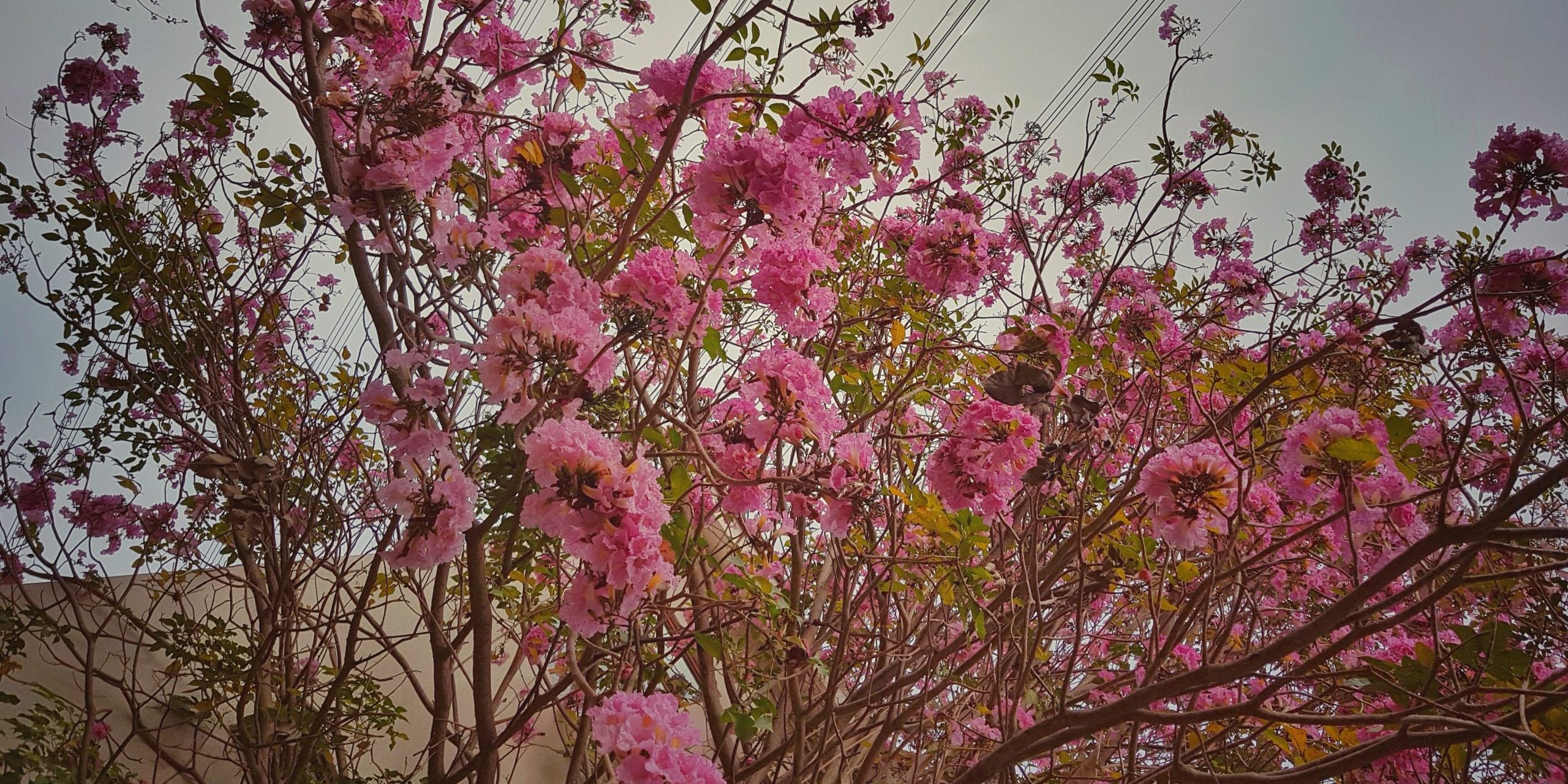Humanity is on a virtual lockdown because of a tiny creature that is 1/2500 the size of a grain of salt. The fear that it brings with it is very real. Of suffering, of uncertainty, of loss.
And, yet they say that after years, the skies are blue again in Wuhan, and you can actually hear the birds singing or soak in a rosy sunset.
While humanity has been caught up in the endless news cycle, spring has gracefully settled in the Northern Hemisphere. A reminder to us all that we may think that the world has stopped as we start to lose control, but nature’s rhythms are in sync with a more cosmic heartbeat.
Spring is here in Bangalore as well, bringing forth blooms of all shades and hues. I look forward to each one of these blooms but there is one that holds a special place in my heart. Bangalore’s own versions of the cherry blossom trees – the “pink tabebuias“ also known as “pink pouis”
Every year, I greet the pink and white blooms like old friends, eagerly waiting to catch a glimpse of my very own patch of pink sky. They bloom gloriously until the start of the spring showers and in the blink of an eye, they are gone.
Last year, as I stood amidst the fallen blooms with a sense of loss and eyes full of unshed tears, I was reminded of the sakura season in Japan and the Zen ethos behind it.
During the months of March/April, the cherry blossom trees (“sakura“) in Japan flower with clockwork precision and viewing of these blossoms (“hanami”- “hana” means flower and “mi” is to see) is a national tradition dating back centuries. Once we look at the gorgeous pictures of sakura in bloom, it is really easy to understand why the Japanese appreciate the ethereal beauty of these delicate white and pink blossoms. After all, the contemplation of beauty for the sake of beauty is quintessential Zen.
And yet with all things Zen, there is a subtler and more profound significance of the sakura season. The blooming of the sakura trees signifies new beginnings and birth; much like most of the other cultures celebrating spring.
However, for most Japanese, it is the falling sakura that is most beautiful. As the sakura flowers gently waft down, like snowflakes, they don’t lose their exquisiteness. Instead, they add a gentle pastel color to the ground beneath their admirers’ feet. The sakura season fills everyone with joy, and also the feelings of wistfulness and melancholy.
These deeply personal emotions are best embodied in two eminently poetic and yet untranslatable Japanese phrases “wabi-sabi“ and “mono no aware“.
These phrases are probably better understood using the language of the heart rather than the mind. “Mono no aware” has many translations online but the one that resonated with my heart at that moment was “sensitivity to ephemera”. It is a reminder of the ephemeral and transient nature of things, a beautiful sadness in the passing of life around us.
Similarly, for “wabi-sabi” as I searched online I was drawn to the phrase- “flawed beauty” – that celebrates the imperfect and impermanent. Wabi-Sabi is the ancient Japanese wisdom of finding beauty in imperfection and simplicity in nature, of accepting the natural cycles of budding, emerging, flourishing, and letting go.
Like the sakura and the blooming of pink Tabebuias, this human life itself can be beautiful and magical and yet it is fragile, impermanent, and somewhat flawed. This is simply the nature of things. It may seem a frightening prospect but we forget that we are in this together – a beautiful interconnected network of mutuality. A reminder to all; to appreciate what we have, including each moment that we experience. And, also to slow down and realize what truly matters in the end.
So, today as we go about practicing self-care and most importantly taking care of those who are most vulnerable during these times, let us pause for a moment.
Let us listen to the cuckoo singing her unique bird song as sweetly as the Italians singing to each other across deserted streets.
Let us pause to stare at the sunset with the same awe and wonder as the aged patient in China along with his doctor.
And, let us look up towards the blue yonder. We might just catch a glimpse of a sky that is painted pink and have our own sakura moment.
As for me, as I stand amidst the fallen blossoms and leaves, I am reminded of the wisdom of wabi-sabi. Nothing is perfect, nothing is permanent, and nothing is finished, and my heart is at peace!






Beautiful Post! Thank you!
Thank you so much Partha for enjoying it 🙂
Good read … really we need to pause n rethink…one of ur pic took me back somewhere 🙂
Thank you Litty! Great to hear that you liked it and it made you think 🙂
Beautiful writing… Took me back to Bangalore. 😊
Thank you, Shailesh! Hope you are able to visit Bangalore soon 🙂